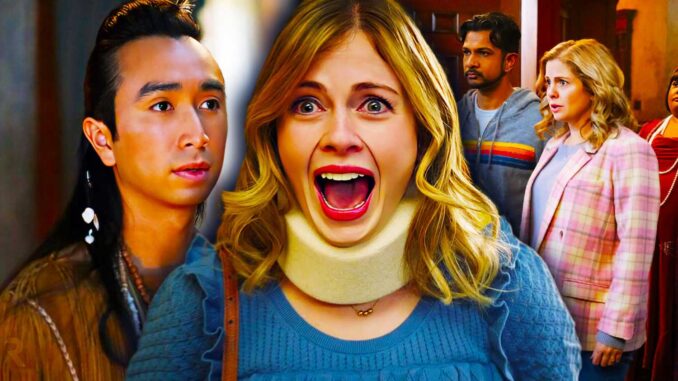
Tracing the Origins of CBS’ Ghosts to the UK: A Transatlantic Echo
The spectral residents of Woodstone Mansion, with their anachronistic quirks and endearing foibles, have charmed millions of viewers on CBS's hit comedy, Ghosts. From the Roaring Twenties jazz singer Alberta to the no-pants Wall Street broker Trevor, the ensemble casts a delightful spell, blending slapstick humor with genuinely poignant moments. Yet, while the show feels distinctly American in its historical tapestry and comedic timing, its very essence, its unique heartbeat, resonates from a different manor across the Atlantic: BBC One’s equally beloved and pioneering Ghosts from the United Kingdom. To truly appreciate the American iteration, one must embark on a spectral journey back to its British genesis, tracing the origins of a concept that proves some brilliant ideas are simply too good to stay in one graveyard.
The story begins in Button House, a sprawling, decaying country estate in rural England, where the BBC original unfurled in 2019. Conceived by and starring the comedic talents behind Horrible Histories and Yonderland – Mathew Baynton, Simon Farnaby, Martha Howe-Douglas, Jim Howick, Laurence Rickard, and Ben Willbond – the British Ghosts introduced the core premise: a young, cash-strapped couple, Alison and Mike Cooper, inherit a crumbling ancestral home, only to discover it’s teeming with the spirits of its deceased residents from various historical eras. A near-death experience for Alison grants her the unique ability to see and hear them, transforming their dream home into a chaotic, hilarious, and ultimately heartwarming communal living arrangement between the living and the dead.
This British blueprint laid the foundation for virtually everything that makes the CBS version so captivating. The central conceit of a modern couple inheriting a house full of anachronistic spirits is lifted directly, as is the pivotal plot device of one partner gaining the ability to communicate with them after a head injury. More profoundly, the British series established the show’s distinctive tone: a delicate alchemy of broad physical comedy, witty wordplay, character-driven humor stemming from the clash of eras, and an underlying current of genuine affection and “found family” dynamics. The ghosts, despite their often selfish or eccentric desires, grow to care for their living housemates, and vice versa. This emotional depth, preventing the show from becoming merely a parade of gags, is a direct inheritance from its UK progenitor.
The most striking echoes, however, are found in the character archetypes themselves. While specific backstories and nationalities are deftly adapted for American history and culture, the spiritual DNA of many CBS ghosts can be directly traced to their UK counterparts. The haughty matriarch of the house, Hetty, the wife of the original robber baron who built Woodstone, is a clear parallel to Fanny Button, the stern, judgmental Edwardian lady of the manor in the UK. Trevor, the pants-less 80s stockbroker, mirrors Julian Fawcett MP, the equally pants-less and morally dubious disgraced politician. Pete, the optimistic, perpetually positive scout leader, is an American echo of Pat Butcher, the affable scoutmaster with a cheerful disposition despite his tragic demise. Even the stoic, proper military officer – Captain in the UK (WWII), Isaac in the US (Revolutionary War) – holds the same stiff-upper-lip charm and repressed desires.
However, CBS’s Ghosts is far from a mere copy. It is a masterful act of adaptation, a testament to how a brilliant premise can be re-contextualized and enriched for a new audience. The American version wisely populates Woodstone with ghosts whose lives, and deaths, are deeply rooted in U.S. history and its diverse cultural tapestry. Instead of a plague doctor, a burned witch, or a Georgian poet, we meet Alberta, the sassy Jazz Age singer; Thorfinn, a Viking raider; Sassapis, a calm and wise Lenape Native American; and Flower, the free-spirited hippie from the 1960s. These characters bring with them uniquely American stories, societal anxieties, and pop culture references that resonate with a different set of historical memory and collective humor. The jokes about Prohibition, the Cold War, or the 80s financial boom land differently than those about the Black Death or specific British political scandals.
Ultimately, tracing the origins of CBS’s Ghosts to the UK is not to diminish the American show’s success, but to celebrate the power of its source material and the skill of its adaptation. The UK version provided the ingenious framework, the comedic sensibility, and the beating heart that makes the premise so universally appealing. The CBS team, in turn, meticulously crafted an equally vibrant, funny, and touching series by imbuing it with distinct American flavors, creating characters that feel authentic to its own history. The Woodstone Mansion we've come to love is undeniably its own entity, yet it stands proudly on foundations laid across the Atlantic, a glorious transatlantic echo that proves some friendly spirits, once unleashed, are destined to haunt, and delight, audiences worldwide.